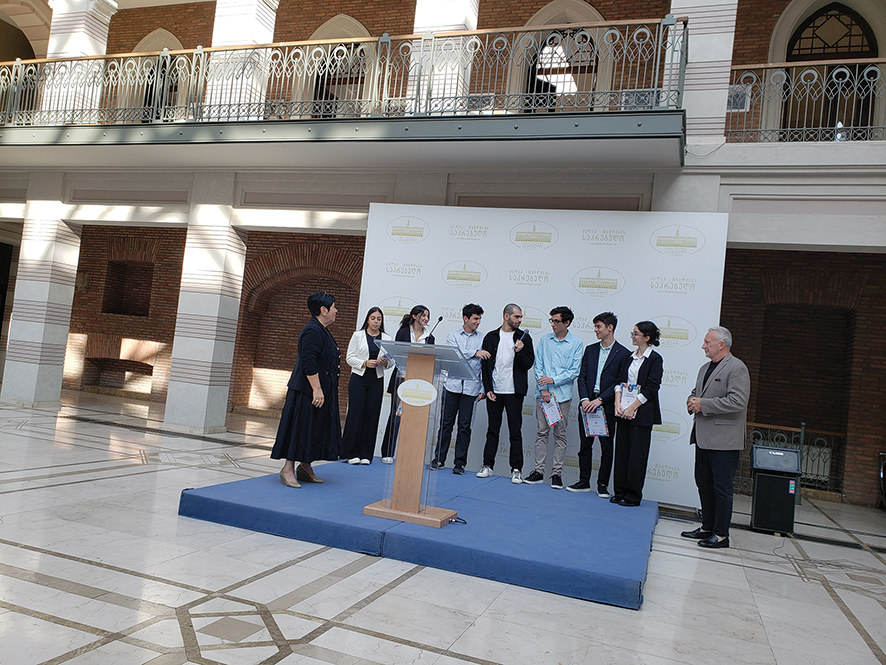
Georgian Academy of Natural Sciences

The Scientific Boom among Our Georgian Youth
https://georgiatoday.ge/the-scientific-boom-among-our-georgian-youth/
In the wake of the soviet collapse, Sakartvelo, like any other one-time soviet socialist republic, has maintained the soviet system of running its National Academy of Sciences, within which the members are periodically elected, based on available quotas, and salaries are paid, as was the case in soviet times.
There are two things that have changed in terms of our academic life: a) the educational system was put on the rails of the well-known Bologna Process, which is the series of agreements between European countries to ensure comparability in the standards and quality of higher-education qualification, and b) the road was paved for volunteer-based alternative academies of science, among them the academies of natural science, engineering, agriculture, medicine, pedagogy, etc.
Amazingly, but truly, some of these scientific clubs, within which members are elected but not paid, are sometimes no less effective in their activities than the National Academy itself. For instance, The Academy of Natural Sciences, headed by the well-known physicist Professor Paata Kervalishvili, is intensively involved in the significant activity of promoting the young scientific cadres of the Republic.
A couple of days ago, in the beautiful atrium of the Tbilisi City Council, an interesting event took place that deserves the attention of our society. Hosted annually in various European countries, the European Union Contest for Young Scientists (EUCYS) is the most significant student science competition in Europe and beyond, revealing the strongest among youth’s scientific accomplishments, and bringing together the brightest young minds to present their projects to a panel of international judges.
Based on the decision of the EU educational and scientific directorate, Georgia was first admitted to the contest with a limited participation of no more than three participants, which nonetheless put Sakartvelo on the EUCYS permanent mailing list. Since 2004, Georgia’s quota in the contest has doubled, which is very encouraging.
On a national level of competition, the participating age bracket is between 14 and 20, including high school juniors and seniors, as well as college students within that age frame. No less importantly, English-language fluency is one of the main preconditions for a contender to take part in the contest.
The potential projects hit almost every field of knowledge, among them natural sciences, social, liberal arts, applied science, engineering, information technology, and medicine. The procedure for presenting a project is simple enough to facilitate participation, but to defend a thesis in front of a strict and competent jury is not easy, thus revealing only the best works for presentation to the European Commission.
Winning candidates are provided with the necessary funds, materials, literature and appliances to continue their work and prepare for the European contest. The expenditure for further action is covered by the Euro Commission, and includes board and lodging, transportation, and certain cognitive programs for national-level winners. The international jury evaluates the candidates and their projects during interviews with them.
Georgia is a regular participant in those Western scientific contests, and Georgian participants have over the years distinguished themselves as very promising young scientists. Some of them have even merited the attention of certain eminent scientists of international standing!
The EUCYS-2023 was hosted by Belgium, in Brussels, on September 13-15. Three projects won at the national-level competition, and were, therefore, presented for judgement to the European contest jury: First place went to the project ‘Web Application Firewall Based on Machine Learning and Artificial Intelligence’ by Andria Kelekhsaev and Alexander Mizandari, the runner-up was a project titled ‘Making a High-Aperture Varifocal Membrane Reflector Telescope’ by Irakli Veshapeli and Anastasia Bolkvadze (this one received the EURO-Fusion prize); and the third place was won by the project ‘Curved Space Displacement Monitoring’ by Ninia Mikautadze and Nia Macharashvili.
Our sincere thanks and congrats go to these wonderful young sons and daughters of Georgia! EUCYS happens to be a huge opportunity for our young thinkers of various fields of knowledge, giving them a chance to acquire new contacts, get involved in actual scientific life with elevated topicality and significance, make progress, and grab a chance to push Georgian scientific thought into the international market. What else could be more important for this nation’s prominence and prosperity?
Professor Paata Kervalishvili, the dedicated patron and sponsor of our young scientists, is firmly supported in this great endeavor by his loyal, steadfast and just-as-devoted colleagues Professor David Aladashvili, serving as the Secretary-Academician of the Georgian Academy of Natural Sciences, Michael Cowgill, President of Georgian-American University (GAU) and Vice-President of the Georgian Academy of Natural Sciences, and Tamar Khulordava, Director of Executive Education Program Foundation. Serving as genuine volunteers, these important public figures of their beloved country are enthusiastically promoting the Georgian national science on a global level by means of nonstop work with the crème-de-la-crème of our younger generation.
Blog by Nugzar B. Ruhadze